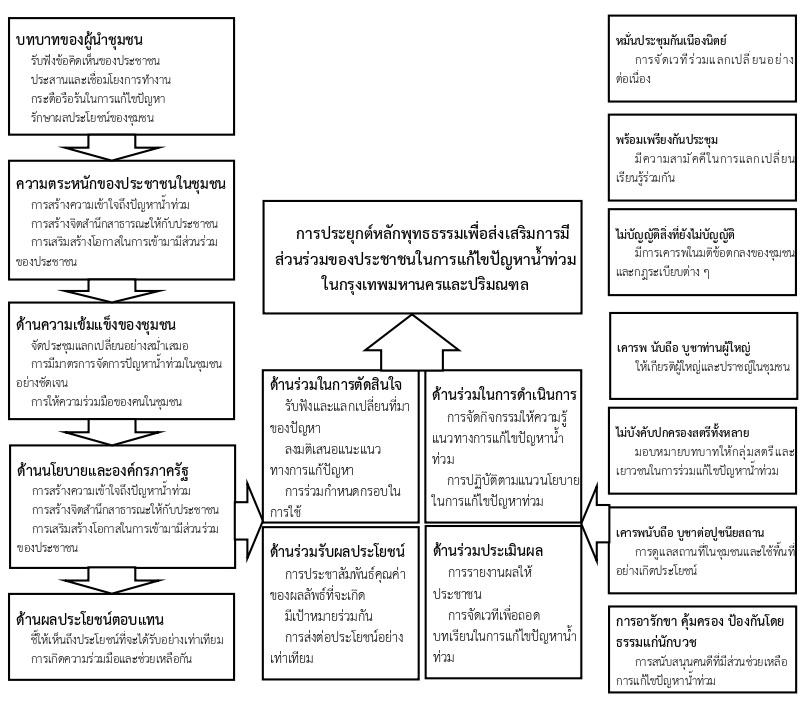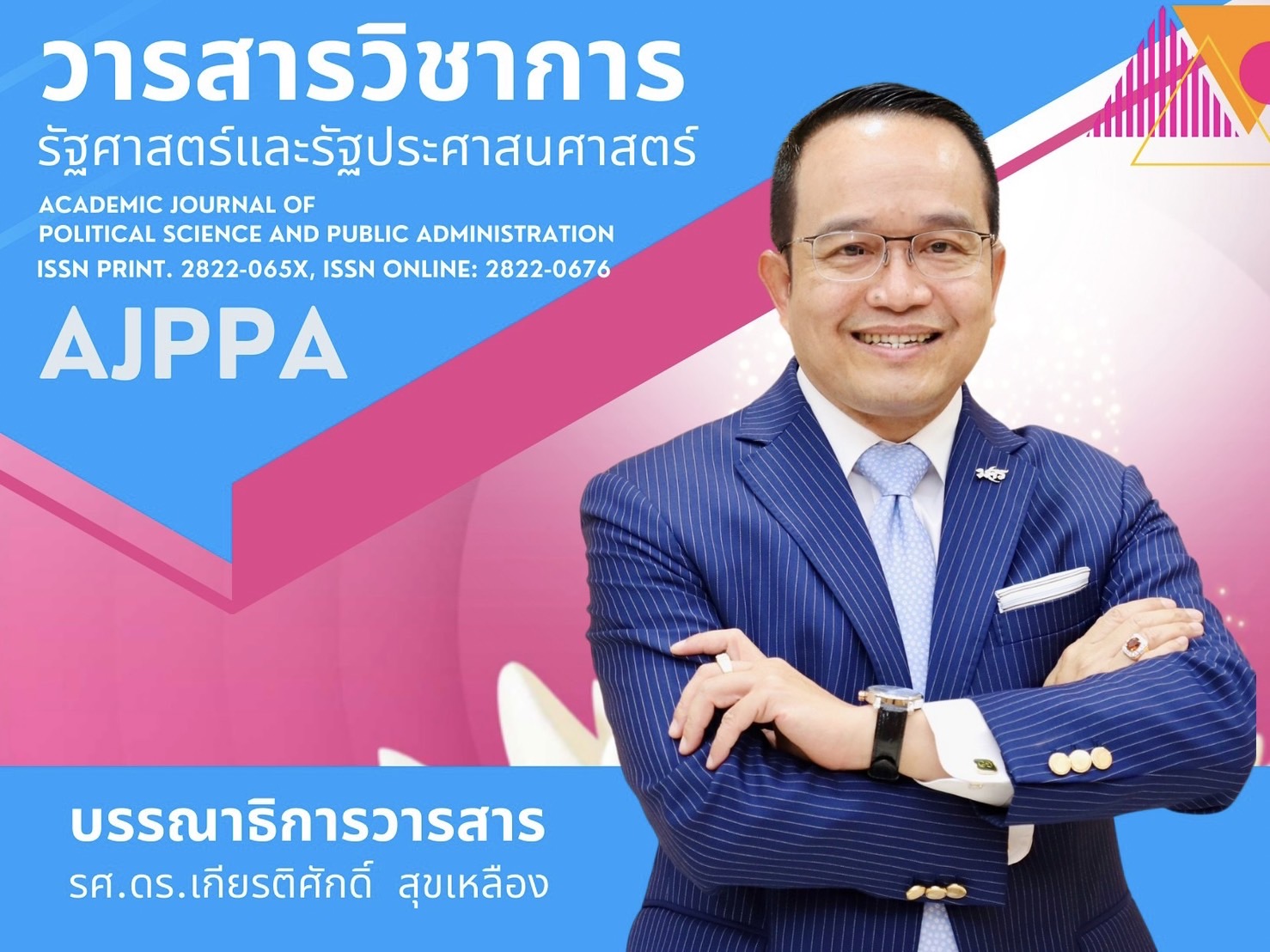การประยุกต์หลักพุทธธรรมเพื่อส่งเสริมการมีส่วนร่วมของประชาชน ในการแก้ไขปัญหาน้ำท่วมในกรุงเทพมหานครและปริมณฑล
คำสำคัญ:
การมีส่วนร่วมของประชาชน, การแก้ไขปัญหาน้ำท่วม, หลักอปริหานิยธรรมบทคัดย่อ
บทความวิจัยนี้มีวัตถุประสงค์เพื่อศึกษา 1. การมีส่วนร่วมของประชาชนในการแก้ปัญหาน้ำท่วม 2. ปัจจัยที่ส่งผลต่อการมีส่วนร่วมของประชาชนในการแก้ปัญหาน้ำท่วม 3. การประยุกต์หลักพุทธธรรมเพื่อส่งเสริมการมีส่วนร่วมของประชาชนในการแก้ปัญหาน้ำท่วมในกรุงเทพมหานครและปริมณฑล โดยผู้วิจัยได้กำหนดรูปแบบการวิจัยแบบผสานวิธี การวิจัยเชิงคุณภาพใช้วิธีการสัมภาษณ์เชิงลึกกับผู้ให้ข้อมูลสำคัญ จำนวน 18 รูปหรือคน และการสนทนากลุ่มเฉพาะ การวิจัยเชิงปริมาณใช้แบบสอบถามเก็บข้อมูลจากกลุ่มตัวอย่างในพื้นที่จังหวัดกรุงเทพมหานคร และปริมณฑล จำนวน 400 คน วิเคราะห์ข้อมูลโดยหาค่าความถี่ ค่าร้อยละ ค่าเฉลี่ย ส่วนเบี่ยงเบนมาตรฐาน และการวิเคราะห์การถดถอยพหุคูณ
ผลการวิจัยพบว่า 1.การมีส่วนร่วมของประชาชนในการแก้ปัญหาน้ำท่วม พบว่า ด้านร่วมในการตัดสินใจ การรับฟังและแลกเปลี่ยน ลงมติเสนอแนะแนวทางการแก้ปัญหาและการร่วมกำหนดกรอบในการใช้งบประมาณ ด้านร่วมดำเนินการจัดกิจกรรมให้ความรู้แนวทางการแก้ไขปัญหาน้ำปฏิบัติตามแนวนโยบายในการแก้ไขปัญหาท่วม ด้านร่วมรับผลประโยชน์การประชาสัมพันธ์คุณค่าของผลลัพธ์ที่จะเกิด ด้านร่วมประเมินผลควรมีการประเมินและรายงานผลให้ประชาชนได้รับรู้ 2. ปัจจัยที่ส่งผลต่อการมีส่วนร่วมของประชาชนในการแก้ปัญหาน้ำท่วม พบว่า นโยบายการแก้ไขปัญหาน้ำท่วม และหลักอปริหานิยธรรม ส่งผลต่อการมีส่วนร่วมของประชาชนในการแก้ปัญหาน้ำท่วมอย่างมีนัยสำคัญทางสถิติ และ 3. การประยุกต์หลักพุทธธรรมเพื่อส่งเสริมการมีส่วนร่วมของประชาชนในการแก้ปัญหาน้ำท่วม พบว่า หลักอปริหานิยธรรม ได้แก่ ด้านหมั่นประชุมกันเนืองนิตย์ ด้านพร้อมเพรียงกันประชุม ด้านไม่บัญญัติสิ่งที่ยังไม่บัญญัติ ด้านสักการะ เคารพ นับถือ บูชาท่านผู้ใหญ่ทั้งหลาย ด้านไม่บังคับปกครองสตรีทั้งหลาย ด้านสักการะ เคารพนับถือ บูชาต่อปูชนียสถานทั้งหลาย และด้านการอารักขา คุ้มครอง ส่งเสริมการมีส่วนร่วมของประชาชนในการแก้ปัญหาน้ำท่วม
เอกสารอ้างอิง
โกวิทย์ พวงงาม. (2553). การจัดการตนเองของชุมชนและท้องถิ่น. กรุงเทพฯ: บพิธการพิมพ์.
เจ้าอธิการพิชิตศักดิ์ สุภาจาโร จีบสันเทียะ.(2559). การมีส่วนร่วมตามแนวพระพุทธศาสนาของประชาชนในการดำเนินงานของสภาองค์กรชุมชนในจังหวัดชลบุรี (วิทยานิพนธ์พุทธศาสตรดุษฎีบัณฑิต สาขาวิชารัฐประศาสนศาสตร์). พระนครศรีอยุธยา: มหาวิทยาลัยมหาจุฬาลงกรณราชวิทยาลัย.
ธีระพล บุญตาระวะ และคณะ. (2563). การบริหารจัดการทรัพยากรน้ำใน. วารสาร มจร สังคมศาสตร์ปริทรรศน์, 11(4), 69-80.
พระสุริโย สุขิโต. (2563). การมีส่วนร่วมของประชาชนในการจัดการสิ่งแวดล้อมขององค์การบริหารส่วน ตำบลสนับทึบ อำเภอวังน้อย จังหวัดพระนครศรีอยุธยา. วารสารพุทธนวัตกรรมและการจัดการ, 3(2), 11-21.
ไพฑูรย์ ปริญญาธรรมกุล. (2563). การปกครองท้องถิ่นรูปแบบพิเศษของเทศบาลนครแม่สอด จังหวัดตาก (ดุษฎีนิพนธ์ปรัชญาดุษฎีบัณฑิต สาขาวิชารัฐศาสตร์). พระนครศรีอยุธยา: มหาวิทยาลัยมหาจุฬาลงกรณราชวิทยาลัย.
มหาจุฬาลงกรณราชวิทยาลัย. (2539). พระไตรปิฎกฉบับภาษาไทย ฉบับมหาจุฬาลงกรณราชวิทยาลัย. กรุงเทพฯ: โรงพิมพ์มหาจุฬาลงกรณราชวิทยาลัย.
สำนักงานทรัพยากรน้ำแห่งชาติ (สทนช.). (2563). แผนแม่บทการบริหารจัดการทรัพยากรน้ำ 20 ปี (พ.ศ. 2561-2580). กรุงเทพฯ: สำนักงานทรัพยากรน้ำแห่งชาติ.
สุกาญจน์ รัตนเลิศนุสรณ์. (2550). หลักการจัดการสิ่งแวดล้อมแบบยั่งยืน. กรุงเทพฯ: สำนักพิมพ์ สมาคมส่งเสริมเทคโนโลยีไทย-ญี่ปุ่น.

ดาวน์โหลด
เผยแพร่แล้ว
รูปแบบการอ้างอิง
ฉบับ
ประเภทบทความ
หมวดหมู่
สัญญาอนุญาต
ลิขสิทธิ์ (c) 2024 วารสารวิชาการรัฐศาสตร์และรัฐประศาสนศาสตร์

อนุญาตภายใต้เงื่อนไข Creative Commons Attribution-NonCommercial-NoDerivatives 4.0 International License.




